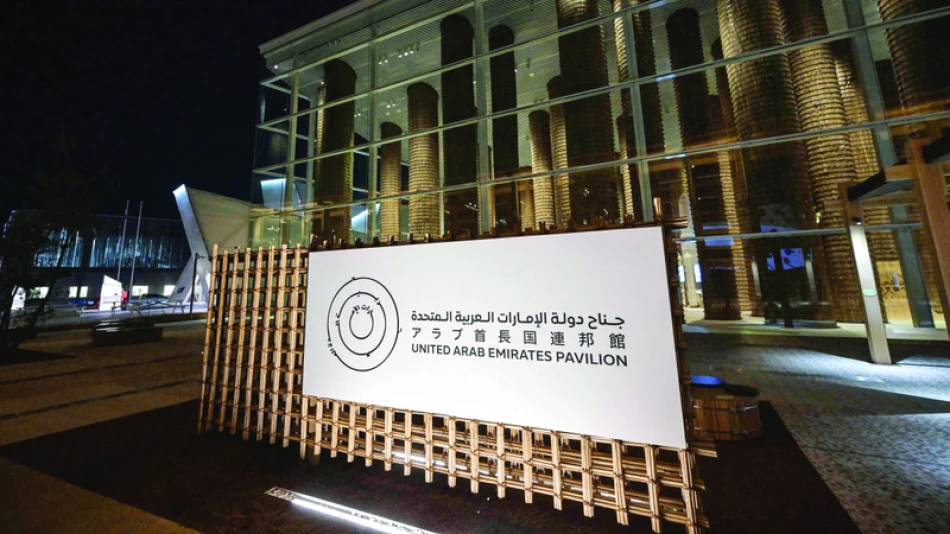
Emirati Pavilion at Expo Osaka Captivates 3 Million Visitors
UAE Pavilion at Expo 2025 Osaka Hits 3 Million Visitors as Cultural Diplomacy Takes Center Stage
The UAE's strategic investment in cultural diplomacy is paying dividends at Expo 2025 Osaka, where its national pavilion has attracted over three million visitors ahead of the country's designated National Day celebration. This milestone reflects the Emirates' sophisticated approach to soft power projection, positioning itself as a bridge between East and West while showcasing its rapid transformation into a global innovation hub.
Cultural Showcase as Economic Strategy
The UAE pavilion's success at Expo Osaka represents more than cultural exchange—it's a calculated move to strengthen economic ties with Japan and the broader Asia-Pacific region. As the Emirates diversifies its economy beyond oil, these international exhibitions serve as powerful platforms to attract foreign investment, tourism, and strategic partnerships.
Mariam Al Maamari, Deputy Commissioner General of the UAE Pavilion, confirmed that September 19 has been designated as the UAE's National Day at the exposition, following Expo tradition of dedicating specific days to participating nations. The celebration will feature traditional Emirati performances, including Ayala folk dance troupes and musicians, creating an immersive cultural experience for international visitors.
Timing Aligns with Regional Ambitions
The UAE's prominent presence at Expo Osaka coincides with its broader "Vision 2071" initiative, which aims to make the country the world's best nation by its centennial. This long-term strategy emphasizes innovation, sustainability, and international collaboration—themes that resonate strongly with Japan's own technological advancement goals.
The three million visitor milestone places the UAE pavilion among the most popular attractions at the exposition, demonstrating the global appetite for understanding the Emirates' rapid development story. This success builds on the UAE's previous Expo hosting experience in Dubai 2020, which attracted over 24 million visits despite pandemic challenges.
Japan-UAE Relations: Beyond Oil and Gas
The pavilion's popularity reflects deepening Japan-UAE ties that extend far beyond traditional energy partnerships. Japan remains one of the UAE's largest trading partners in Asia, with bilateral trade exceeding $30 billion annually. However, both nations are now focusing on collaboration in renewable energy, artificial intelligence, and space exploration.
The cultural programming at Expo Osaka serves as a foundation for these expanded partnerships. By showcasing Emirati traditions alongside cutting-edge innovation displays, the UAE is positioning itself as a reliable partner that respects tradition while embracing technological advancement—a narrative that resonates strongly with Japanese business culture.
Soft Power Competition in Asia
The UAE's Expo success occurs amid intensifying soft power competition in the Asia-Pacific region. Countries like Singapore, South Korea, and Australia are similarly investing heavily in cultural diplomacy to strengthen regional influence. The Emirates' approach—combining traditional culture with future-focused messaging—offers a unique value proposition in this crowded field.
The pavilion's interactive exhibitions highlight the UAE's contributions to sustainable development and cross-cultural dialogue, themes that align with Japan's own international priorities. This strategic alignment helps explain why the UAE presentation has resonated so strongly with Japanese audiences and international visitors alike.
Economic Implications for Both Nations
For investors and policymakers, the UAE pavilion's success signals strengthening bilateral relations that could yield significant economic opportunities. Japanese companies are increasingly viewing the UAE as a gateway to Middle Eastern and African markets, while Emirati sovereign wealth funds continue expanding their presence in Japanese technology and infrastructure sectors.
The cultural foundation being built at Expo Osaka may facilitate future agreements in critical areas like hydrogen energy development, smart city technologies, and financial services innovation. As both countries navigate post-pandemic economic recovery, these partnerships offer mutual benefits that extend well beyond the exposition's six-month duration.
Most Viewed News

 Sara Khaled
Sara Khaled






